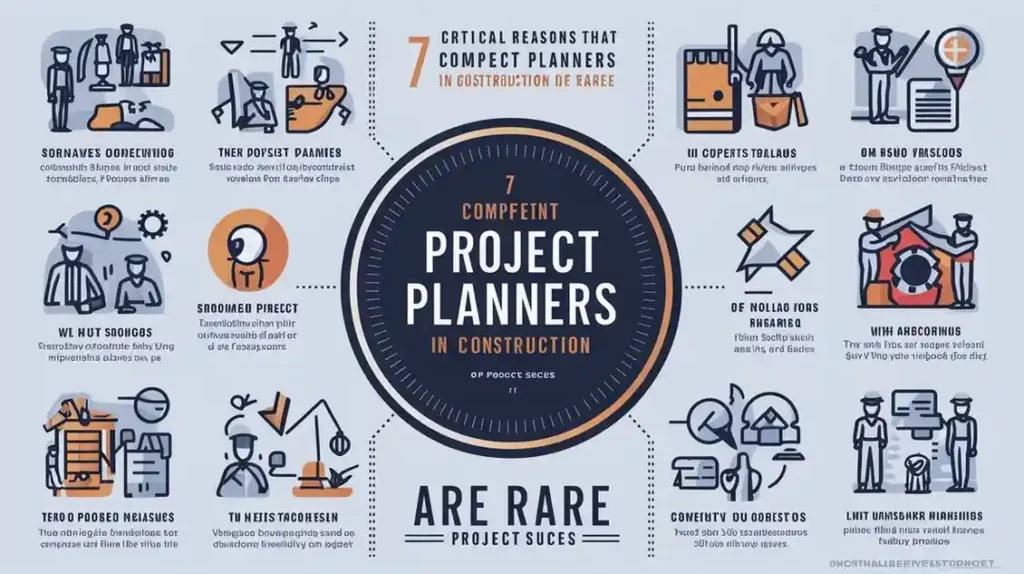Introduction
Why is it so elusive to find competent project planners in construction? If you’re a client or project manager with 8-30 years of experience, you’ve likely seen it all: schedules stitched together from subcontractor scraps, logic errors that defy reason, and endless re-baseline requests when deadlines slip. Contractors are contractually obligated to deliver on time—so shouldn’t they be the ones mastering timelines? Yet, here you are, chasing competent planners like they’re unicorns.
The stakes in construction are high, and poor planning can cost millions. Here’s a quick tip to start: Run contractor schedules through a DCMA 14-Point Assessment checklist to spot red flags fast. In this 2000+ word deep dive, we’ll unpack why skilled planners are so rare, whether it’s incompetence or strategy at play, and how you can bridge the gap—ensuring your next project stays on track from day one.
Why Competent Project Planners Are Rare in Construction
Misaligned Incentives
Lack of Specialized Skills
The High Cost of Subpar Planning
Bad schedules don’t just annoy—they devastate budgets, timelines, and trust.
Delays and Budget Blowouts
Rework Overload
Incompetence or Strategy? Decoding Contractor Behavior
Are subpar schedules a skill issue or a sly move? Often, it’s both.
Skill Shortfalls
Float Hoarding Tactics
Folder Templates for Sanity
Tip: Set this up monthly—e.g., “Q1 2025”—to cut sorting time later.
Success Story: From Planning Chaos to Precision
The Scenario: A $20M high-rise client battled fragmented schedules and monthly re-baselines from a contractor team. Delays loomed.
The Fix:
- Hired a Competent project planners in construction to audit schedules using DCMA 14-Point criteria.
- Ran a two-day joint workshop with contractors and subs to align logic and dependencies.
The Result:
Schedule accuracy jumped 35%, re-baseline requests fell 60%, and the project finished three weeks early—saving $200K in overhead.
Key Insight: Proactive clients can turn contractor weaknesses into wins with the right tools and collaboration.
Practical Fixes for Contractor Planning Gaps
Enforce Rigorous Standards
Tip: Tie payment milestones to a minimum quality score—say, 85%—to enforce compliance.
Schedule Regular Check-Ins
Example: A 15-minute review spots a mislinked HVAC task, saving a week of rework.
Leverage Risk Analysis Tools
Pro Tip: Highlight top 5 high-risk tasks in reports to focus contractor attention.
Vet Planner Credentials
Example: A certified planner catches a sequencing flaw a junior misses—saving $100K in delays.
Run Joint Planning Workshops
Tip: Use a shared whiteboard (virtual or physical) to map critical paths live—buy-in sticks better.
Conclusion
Finding Competent project planners in construction is like striking gold—rare and rewarding. But even with average planners, you can safeguard your project. For veterans with 8-30 years in the game, it’s about wielding experience to enforce discipline:
- Poor planning costs time, money, and trust—don’t let it slide.
- Gaps stem from skill deficits or sly float grabs—audit to know which.
- Standards, reviews, and tools turn chaos into control.
Next step? Before your next bid, draft a DCMA checklist and workshop agenda. You’ve built a career on execution—now demand the planning to match.
Want to become a top project manager? Discover the 7 personality traits that define successful project managers and how to cultivate them by reading our insightful blog here.








